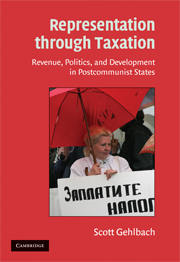Book contents
- Frontmatter
- Contents
- List of Tables
- List of Figures
- Acknowledgments
- Note on Transliteration
- 1 TAXES, REPRESENTATION, AND ECONOMIC DEVELOPMENT IN THE RUSSIAN HEARTLAND
- 2 THE CREATION OF TAX SYSTEMS
- 3 THE LOGIC OF REPRESENTATION THROUGH TAXATION
- 4 PATTERNS OF COLLECTIVE-GOODS PROVISION
- 5 REVENUE TRAPS
- 6 CONCLUSIONS
- Bibliography
- Author Index
- Subject Index
- Titles in the series
1 - TAXES, REPRESENTATION, AND ECONOMIC DEVELOPMENT IN THE RUSSIAN HEARTLAND
Published online by Cambridge University Press: 31 August 2009
- Frontmatter
- Contents
- List of Tables
- List of Figures
- Acknowledgments
- Note on Transliteration
- 1 TAXES, REPRESENTATION, AND ECONOMIC DEVELOPMENT IN THE RUSSIAN HEARTLAND
- 2 THE CREATION OF TAX SYSTEMS
- 3 THE LOGIC OF REPRESENTATION THROUGH TAXATION
- 4 PATTERNS OF COLLECTIVE-GOODS PROVISION
- 5 REVENUE TRAPS
- 6 CONCLUSIONS
- Bibliography
- Author Index
- Subject Index
- Titles in the series
Summary
On November 10, 1997, Evgeny Mikhailov sat down with a handful of journalists to discuss his first year as governor of Pskov oblast, a beautiful but struggling region in northwestern Russia just over the border from Belarus and the Baltics. Mikhailov had received his share of attention the year before when he beat out the incumbent governor to become the only member of Vladimir Zhirinovsky's nationalist Liberal Democratic Party of Russia to be elected head of a Russian region. Given Zhirinovsky's often outrageous statements on questions of foreign policy — he once suggested building a giant fan to blow radioactive waste over the Baltic states — many expected Mikhailov's first year to be dominated by saber rattling and diplomatic disputes. However, Mikhailov's electoral platform had emphasized economics, not geopolitics, and in this year-end press conference the focus was on economic achievement.
At the top of the governor's list of achievements during the previous year was the creation of a local vodka industry under government control. To an outsider, it might seem a strange accomplishment to trumpet. Vodka had not been produced in Pskov in recent memory, and consumers could already choose from among a wide range of vodkas produced within and outside of Russia. Any economics student would have suggested that the region focus instead on promoting those sectors in which it had some comparative advantage.
- Type
- Chapter
- Information
- Representation through TaxationRevenue, Politics, and Development in Postcommunist States, pp. 1 - 19Publisher: Cambridge University PressPrint publication year: 2008

